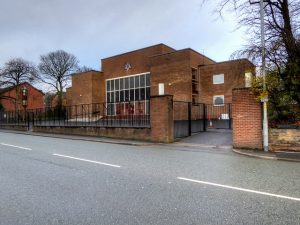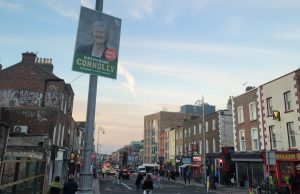
Why anti-border politics is class struggle
Timor Edwin •At rs21’s Festival of the Oppressed event, Timor Edwin‘s talk argued that any serious anti-capitalist politics must take anti-border politics seriously. Below is an edited version of the talk.
I want to use this intervention to stress the centrality of borders in the reproduction of contemporary capitalism and to argue that any principled anti-capitalist politics today must also be an anti-border politics. This applies whether we are organising inside a Marxist collective, an activist group, or engaging in a broad left electoral project, where all too often migrants’ rights are often thrown under the bus as soon as people try to win votes by appealing to nationalism.
We are not just against borders because they are morally abhorrent – although it is clear that they are. The violence in the camps all around the imperial core, the drownings in the Mediterranean and the Channel, the deportations that tear families apart and send teenagers into countries they have never seen before, the policing that forces some people into an underground world far away from public perception, should be enough to convince us. But too often, moral arguments alone don’t move the broader left, especially those still seduced by nationalist social democracy or nostalgic and mistaken visions of a ‘British working class’ sealed off from the rest of the world, rather than part of one connected world market that is just differentiated by borders and their corresponding regimes of class rule.
Border politics are always directed against the working class as a whole
When the state directs its violence outward – against people on the so-called small boats, against the asylum seeker in the camp, against the undocumented worker in Islington or Berlin or LA or the Gulf states, the violence does not stop there. It seeps inward. It unfolds as a broader attack on documented migrants too, and on the ‘domestic working’ class more broadly.
Borders are an attack on the working class as a whole because their primary function in the present is producing and spatialising social difference across one shared, transnational social space. This difference is the real social difference we can perceive in everyday life. Borders do not just include or exclude people – they ‘differentially include’. That’s because the vast majority of people who attempt to cross borders succeed in doing so. Yet, it is their crossing of a border that suddenly attaches a specific status to them. The dozens of millions of migrant workers in Britain, Germany, the US, and the Gulf states are not simply excluded or at the periphery of each society; they are differentially included into their centre. In this sense, liberals hint towards an important truth when they say that ‘our economy’ would fail without migration. But what does this mean?
Differential inclusion means there is a difference of workers’ access to certain rights and protections as part of the same national economy. As we know, it is a major difference for a person’s life whether they are a citizen, a permanent resident, a temporary migrant worker, on a student visa, on a humanitarian visa, have formal refugee status or are illegalised. These differences affect access to the welfare state and certain political rights and protections, through which they affect wages in a national economy generally by putting migrant workers and domestic workers into an artificial competition with different sets of rights. In effect, this means that the state provides an environment in which capitalists can pit workers against each other.
If we look at Labour’s immigration White Paper, for example, we see pretty clearly how such a strategy plays out, but first we’ll have to take a look at the last couple of years of immigration policy. Although right-wing Brexit campaigners sold the reduction of net migration from Eastern Europe as a main goal of Brexit, we know that net migration actually doubled in 2021 and 2022. This is because the new skilled workers visa was supposed to satisfy the continuous thirst of businesses in the health and social care sector, as well as construction and IT, for a flow of cheap, easily exploitable migrant labour.
While EU workers benefited from protections that come close to citizenship, ‘skilled’ workers’ residency in Britain is largely dependent on them staying employed. If you lose your job after two years in Britain, you have 60 days to find a new visa sponsor. If you don’t find a job within those 60 days, your residency becomes “illegal” – you are now an “illegal” immigrant, you can get deported, you get a 10-year entry ban if you don’t leave within 30 days, and your future visa applications will likely get rejected.
Workers who find themselves under such conditions are much more precarious and much easier to exploit and oppress than workers with citizenship or the rights granted to EU workers before Brexit. If your prospect is that you can apply for permanent residency after five years of continuous residence in Britain, workers are much more likely to endure any type of humiliation from their boss, and they are less likely to join their union or partake in strike action and stand up for themselves.
Even worse, if they do end up getting fired, they are likely to take almost any job within those 60 days that grants them a visa, and therefore also more likely to accept jobs that pay below what is common in their sector. And this is where such migrant labour regimes affect the national economy as a whole. It is through the threat of the withdrawal of rights and residency that the state creates a condition for capitalists to super-exploit migrants, i.e., to pay them below what is common in their sector. We know that it is a right-wing lie that migration is bad for workers generally, but what is true is that the border regime creates conditions that capitalists exploit to drive down wages for all workers. The obvious consequence for Marxists is hence not to complain about the workers who are compelled to accept lower wages and precarious contracts, but to fight against the conditions that force them to accept them.
In its immigration White Paper, Labour announced that its government will extend the period of necessary continuous residence from 5 to 10 years. This means that instead of five years of precarity and vulnerability to superexploitation, workers will be in those conditions for 10 years. This is an attack on workers generally. For 10 years, people will have to accept ever-increasing oppression and exploitation at the workplace. This will likely also deteriorate conditions for workers across the British economy. We have to fight against such immigration regimes – and our fight against the border is part of our class struggle.
Even when extremely violent border and immigration politics block a country off, the remaining “domestic” working class will suffer. To ensure that wages remain low despite the removal of those who, through manufactured super-exploitation, made low-profit sectors viable, employers will seek the state’s support to increase both absolute and relative surplus value. In “non-Marxist theory bro” terms, this means longer working days, fewer bank holidays, lower wages, attacks on unions, a higher retirement age, and increased control, surveillance, and coercion in the workplace.
If we understand how such tightening of immigration and visa regimes is an attack on the working class through differentiation, we can also understand how borders are connected to racism. Borders are not just an outcome of racist ideologies against workers from elsewhere. Instead, the different legal and social conditions they create are conducive to processes of racialisation.
Racism is often a pathologisation of social difference. This means that when people start seeing social difference – for example the difference created through the immigration system – as an essential part of a person’s biology or culture, something tied to their identity. When I researched this in Turkey, where Syrian refugees are often forced to work for salaries four times lower than their Turkish colleagues, even left-wing workers often blamed the Syrians rather than their employers. They would complain that Syrians accept everything from the employer and find the reasons for this in their “backwardness”, that they are from “rural areas”, or that they come from a “feudal culture”; instead of realising that the situation of Syrians in Turkey was so precarious that they had to accept any salary to survive.
The situation in Britain – and many postindustrial economies – is similar. The border regime lures workers into buying the stories they are told about each other. That some are better than the others, that crime is something cultural or biological rather than something social, and that the worth of a person is determined by their usefulness in the production process. The border regime is the physical manifestation of the capitalist logic that humans need to “deserve” to be part of our societies. Once their labour is “used up”, their bodies become worthless for capitalist production, and they cannot find employment anymore, the state deports and exiles them from our communities.
This is a manifestation of everything Marxists, socialists, communists, and anticapitalists are fighting against. In our vision, humans are more than their usefulness to capital. We see everywhere around the world that people refuse to be fully commodified. When people defend their communities against deportation raids in London or Edinburgh or Manchester, when people fight back against the state forces trying to tear their communities apart in Los Angeles, and when people all over the world march together to defy the border system, they are defending a vision of life beyond the capitalist law of value – and they deserve our full and unconditional support.
Therefore, if we enter any social movement or electoral formation, we need to fight for anti-border politics as a central part of our class struggle. In practical terms, this means an end to deportations. A full amnesty for all undocumented migrant workers, which would have an immediate positive effect on wages, and direct, fast pathways towards citizenship for everyone who lives in Britain.







1 comment
As someone who grew up in North Africa, a so-called “buffer zone” for Europe’s border politics, I deeply recognize what you describe.
Borders don’t just divide people physically. They manufacture layers of personhood, legality, and dignity. And the brutality they enable is often invisible until you’ve lived it.
This resonates especially with how migration regimes don’t just exclude, they stratify and exploit.
Thank you for articulating this with such clarity. It deserves to be read more widely.
There’s something powerful about reading theory that sounds like real people lived it. You write like someone who’s listened.